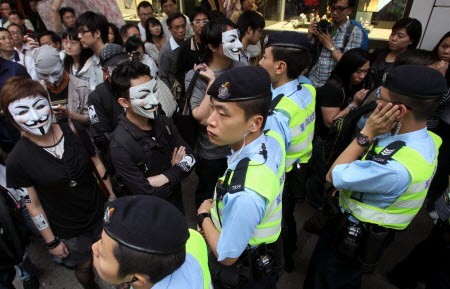New police trial of body-mounted video cameras sparks concern
Lawmakers and activists worry plans to extend use of body-mounted video devices to film confrontations could lead to abuse of power

The fears were voiced after the extended trial - which widens use of the cameras from three police districts to all - was outlined to lawmakers yesterday.
But a security official said the cameras had helped to calm subjects being filmed, reducing the need for arrests.
Officers of the elite Police Tactical Unit of Hong Kong Island Region and emergency units in Kowloon West and New Territories North took part in the first phase of the trial between March and September last year.
The second stage, including emergency and tactical units in all regions plus frontline units involved in tasks "of a similar nature", will take a year from the second quarter of this year.
The device - mounted on an officer's shoulder facing outwards - is restricted to use in "confrontational scenarios" or "incidents where a breach of the peace has occurred or is likely to occur", police say.
Undersecretary for security John Lee Ka-chiu told a Legislative Council security panel meeting yesterday that officers in the first trial found that subjects showed more restraint upon learning they were being filmed.
But the panel's deputy chairman, James To Kun-sun, said: "There should be at least two cameras - one facing the officer and the other the subject being filmed."
Lee replied that although facing outwards, cameras also often captured the officer's movements and recorded his voice.
Of the 25 times they were used, the person filmed in 13 cases began acting with greater restraint and thus did not require any investigation, he said.
Footage taken had yet to be submitted as court evidence, he said, as among the 12 videos used for investigation, subjects in seven cases pleaded guilty or agreed to be bound over. Investigations are ongoing for the remainder.
But social activists are concerned about the reasons police might retain such footage beyond the specified 31-day limit after filming. Icarus Wong Ho-yin, convenor of the police powers monitoring group of the Civil Human Rights Front, urged the force to regularly make public the number of clips retained and the reasons for doing so.
A detailed review will be conducted after the second stage.
